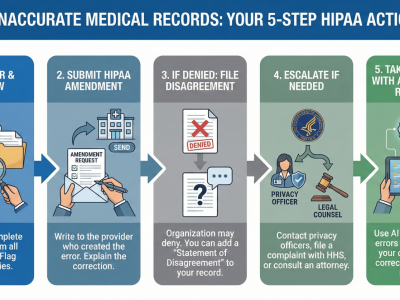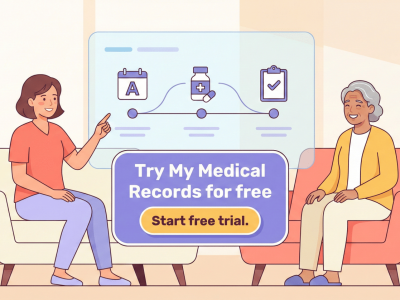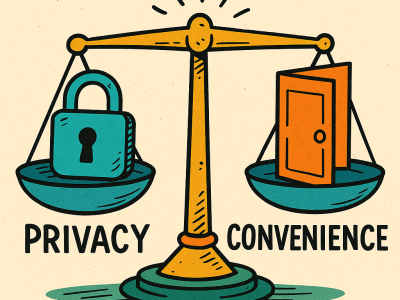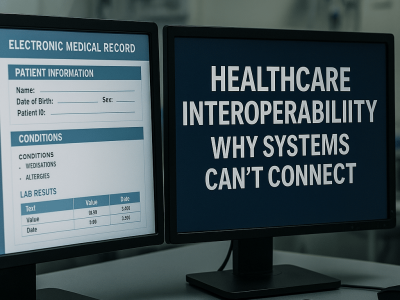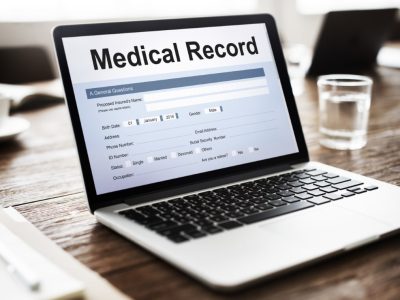Storing medical records securely is crucial in today’s digital age. Learn about the safest and most convenient ways to store, access, and manage your health records online, and how platforms like My Medical Records are leading the change with AI-driven security and accessibility.
KEY TAKEAWAYS
- Secure online platforms ensure accessibility and privacy for personal health records.
- Storing digital medical records reduces the risk of loss or unauthorized access.
- My Medical Records uses AI to simplify record management for patients and professionals.
- Centralized digital storage improves efficiency in emergencies and routine care.
- Knowing where and how to store records helps with insurance claims and legal matters.
Table of Contents

In the digital era, keeping track of your medical history is no longer just about folders in a cabinet or stacks of paper at your doctor’s office. Whether you’re managing a chronic illness, preparing for a legal case, or just want peace of mind, the way you store your medical records matters. As healthcare becomes more digital, storing your health information securely and accessibly online is not only smart—it’s essential.
People are beginning to see the advantages of cloud-based health record platforms, especially those that prioritize both data privacy and usability. With the help of AI-driven technologies like My Medical Records, individuals can gain complete control over their medical history, ensuring they can retrieve or share vital documents whenever needed.
Why Digital Medical Record Storage Is Better Than Paper
While paper records still exist, they pose several risks: physical damage, loss, and inaccessibility during emergencies. On the other hand, digital storage platforms are built to eliminate these concerns while improving efficiency.
First, digital medical record platforms offer 24/7 access, which is vital when dealing with emergencies or urgent care situations. You no longer have to rely on office hours or paperwork being faxed from clinic to clinic. Everything you need can be found in your secure online account. These systems are often HIPAA-compliant and use advanced encryption, ensuring that sensitive data remains confidential.
Second, organizing your records digitally makes it easier to share important health documents with healthcare providers, specialists, or insurance companies. Rather than sifting through physical folders, you can send a link or PDF in seconds. If you’re wondering about the details contained in these documents, you might be interested in learning what a medical record number is and how to find it to make your records easier to identify.
Lastly, storing records online ensures better backup and recovery options. Unlike paper documents that can be destroyed by fire or flood, digital records can be duplicated and stored in multiple secure locations.

How Long Should Medical Records Be Kept?
Understanding how long to keep medical records is just as important as knowing where to store them. Different types of records have varying retention requirements based on local laws, insurance policies, and the type of care provided.
For example, adult medical records are typically kept for 7 to 10 years after the last treatment. Pediatric records often need to be retained until a child reaches the age of majority plus several additional years. This can make managing large volumes of documents overwhelming, especially for those with chronic conditions or long-term treatment histories.
For legal and insurance purposes, retaining complete and organized medical records is essential. Failing to do so can delay claim approvals or result in loss of key data. If you’re uncertain about the specifics, this guide on how long medical records need to be kept can be helpful when creating your own storage plan.

Choosing the Right Medical Record Storage Platform
Not all platforms are created equal. When evaluating where to store your medical records, security should be your number one priority. Ensure the service offers end-to-end encryption, multi-factor authentication, and complies with local and international privacy laws.
AI-enhanced platforms like My Medical Records go a step further. Not only do they provide safe storage, but they also help you organize, tag, and retrieve your files intelligently. Through smart categorization and search functions, you save time and reduce the chances of overlooking critical information.
Additionally, platforms with a clear privacy policy and accessible support team are preferable. You can get a clear idea of how a service works by reading their About page, which should explain the company’s mission, security standards, and support offerings.

Why Choose Online Platforms Like My Medical Records
Digital storage platforms like My Medical Records are built specifically for users who want to manage, protect, and access their medical history anytime. The platform is powered by AI and offers smart filing, keyword searching, and cloud-based security features that go far beyond paper folders or local hard drives.
Through a secure login, users can upload hospital records, lab results, prescriptions, vaccination history, and more. Once uploaded, documents are categorized automatically and stored in encrypted servers.
This system not only allows users to stay organized but also enables them to easily share specific records with healthcare providers, insurance agents, or legal professionals when needed. It bridges the gap between convenience and confidentiality.

Mobile Access and On-the-Go Convenience
In today’s mobile world, being able to access your medical records from anywhere is crucial. My Medical Records offers mobile compatibility, meaning you can view, upload, or share documents right from your smartphone or tablet.
This is especially useful in emergency situations or when you’re away from home. If you’re traveling and need to show your vaccination history, or if a loved one gets admitted and you need their medication list, it’s all available at your fingertips.
You can even store medical records for your entire family under one account—perfect for parents managing pediatric care or adults supporting aging parents.
How to Set Up and Maintain Your Online Medical Record Storage
Setting up your online storage takes just a few steps. First, scan or upload your medical records to a secure platform. Label each document clearly with the date, type of service, and provider information. This helps later when you or your physician needs to locate a specific file.
Routine maintenance of your health documents is equally important. Periodically check for outdated, duplicated, or unnecessary files. Keep only the most relevant records while following legal retention guidelines. If you need support during this process or want to learn more, don’t hesitate to contact the team at My Medical Records for assistance.
It’s also wise to regularly back up your files to a second secure location—such as an encrypted external drive or another HIPAA-compliant cloud system. While My Medical Records already has backup protocols in place, redundancy adds peace of mind.
Helpful Tips for Organizing Your Medical Records
Use consistent file naming conventions and update your medical record uploads after every significant medical visit. Doing so makes it easier to track your health history and improves communication between you and your care providers.
Summary:
Knowing where to store your medical records can make a real difference in the quality of care you receive and your overall healthcare experience. From faster access during emergencies to simpler insurance claims and legal support, secure digital storage ensures your data is both safe and accessible. My Medical Records provides an innovative, AI-powered solution that streamlines this process—empowering patients, supporting professionals, and transforming how we manage our health.
Related Topics:
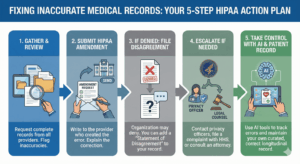
What to Do If There Is Inaccurate Data in Your Medical Record
The chart that does not match you You probably discovered the inaccurate medical records error because something routine went wrong: a prior authorization denied, a
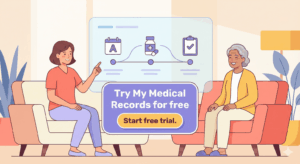
From Chaos to Clarity: A Family Caregiver’s Guide to Unified Health Records
Here’s what nobody tells you about caregiving: The hardest part isn’t watching your loved one struggle with their diagnosis. It’s trying to keep track of
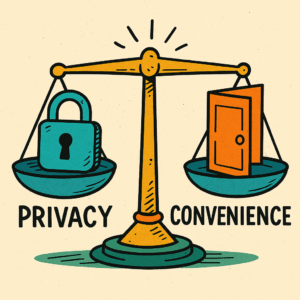
Privacy vs Access: Finding the Right Balance in Your Digital Health Record
Healthcare interoperability is the ability of different healthcare systems, devices, and applications to seamlessly share, understand, and use patient data across organizations and geographic boundaries.
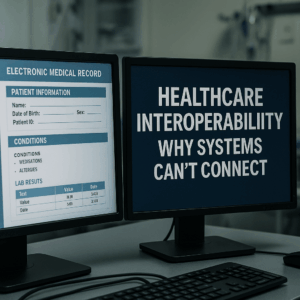
Healthcare Interoperability: Why Systems Can’t Connect
Healthcare interoperability is the ability of different healthcare systems, devices, and applications to seamlessly share, understand, and use patient data across organizations and geographic boundaries.

How to Merge Medical Records from Multiple Doctors and Avoid Errors & Duplicates
Learn how to merge medical records from multiple doctors, avoid duplicate entries, and reduce errors. Use AI tools like My Medical Records to simplify the process.

What Happens to Your Medical Records After a Doctor Retires or a Clinic Closes?
Learn how to merge medical records from multiple doctors, avoid duplicate entries, and reduce errors. Use AI tools like My Medical Records to simplify the process.

